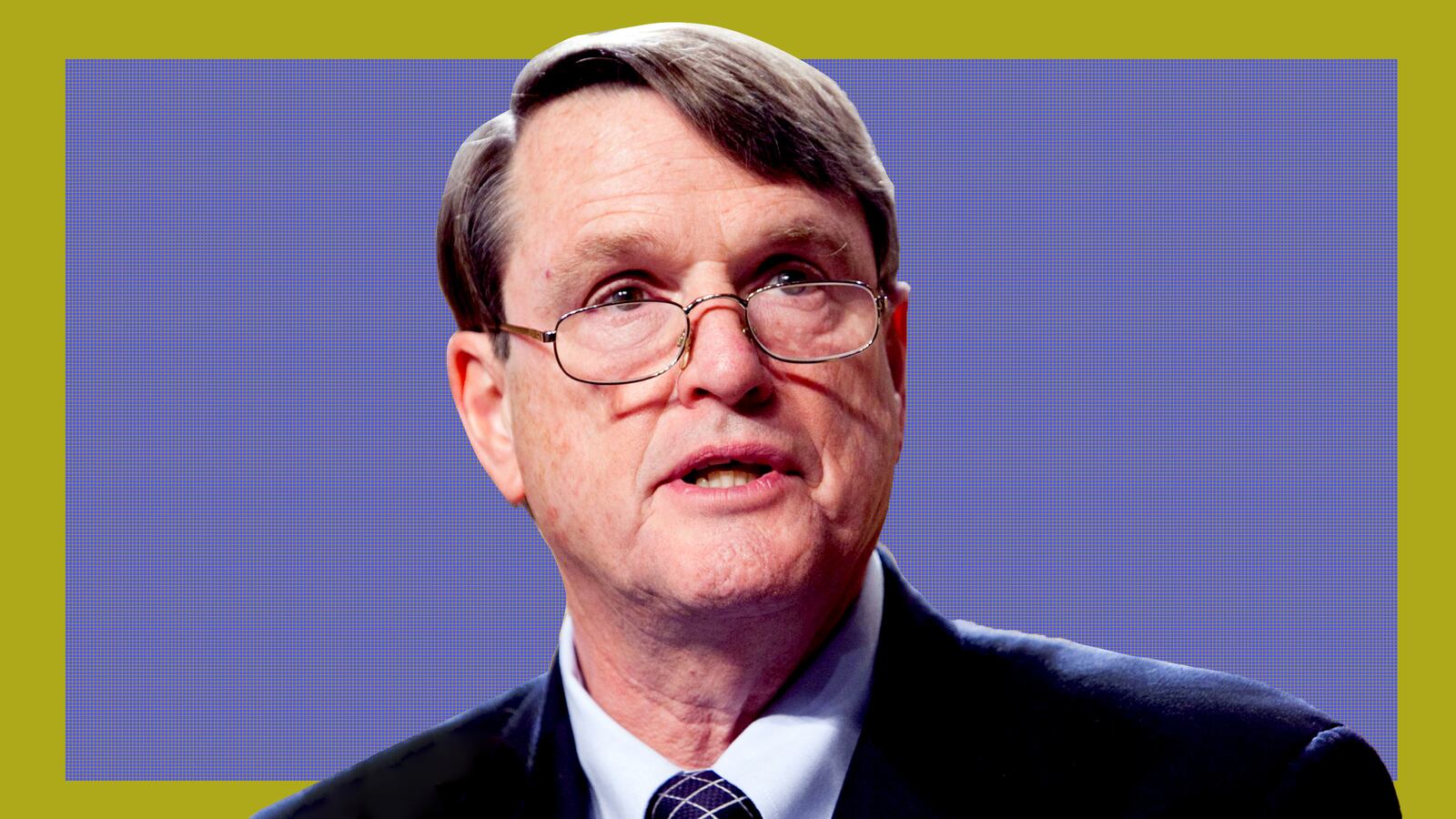The American public’s trust in the news media has probably eroded even further in the five months since the Committee to Protect Journalists released former Washington Post Executive Editor Leonard Downie Jr.’s disheartening report detailing the effectiveness of President Donald Trump’s campaign to discredit working reporters who cover his administration.
“It’s gotten worse,” the 78-year-old Downie told The Daily Beast, adding that he hopes his just-published memoir, All About The Story—chronicling his four-decade journey from cub reporter to big boss—plays some small role in restoring the profession’s credibility.
“I hope that they will see, by my taking them inside in great detail, how factual journalism works,” said Downie (under whom this writer, a former Post reporter and columnist, toiled for the better part of 23 years). “And how the difficult decisions that need to be made in dealing with factual journalism—including very aggressive factual journalism, investigative reporting that brings about change, decisions about national security and politicians and so on—will help them understand, and believe in, the mission of factual media and the credibility of factual media.”
As the election draws near, Downie stressed how important it is for journalists to cover not only the presidential debates and campaign maneuverings of Trump and Joe Biden along with the specter of disinformation and covert foreign meddling, but also to report, in a granular way, the voting process and how absentee and mail-in ballots are being handled and counted in the battleground states.
Ditto the Republican-controlled Senate’s hurried consideration of Supreme Court nominee Amy Coney Barrett—who, he said, deserves a thorough vetting by the press.
Downie also worries about the impact of partisan media outlets, especially Fox News.
“It’s become clear that Fox News is not a factual news network,” Downie said. “It doesn’t aspire to be a factual news network. Clearly, it holds its audience best by not just being conservative in much of its coverage and all of its opinions, but also quite pro-Trump and not factual much of the time, and clearly has a symbiotic relationship with Trump, in that a lot things that he sees on Fox, including things that are false, he then tweets out or puts into his speeches or responds to reporters as facts when they’re not facts.”
At the present cultural moment, in which the term “fake news” enjoys far more currency than “factual media,” Downie’s quaint hope that somehow journalism and journalists will rise in the public’s esteem could seem pollyannish and unrealistic.
Yet, for those who wish to know how the sausage is made, his book presents illuminating narratives and anecdotes involving such celebrated (and occasionally Hollywoodized) figures as Ben Bradlee, Katharine Graham, her son and successor Don, Carl Bernstein, Michael Isikoff, and Dana Priest—all practitioners or protectors of journalism who’ve made a difference in the world.
Downie reveals, for instance, that after Don Graham’s niece, the Post’s newly installed publisher Katharine Weymouth, decided that Downie should retire in 2008—four years earlier than he’d planned—he and Don, who’d picked him for the job in 1991, met one-on-one “and began to cry unashamedly.”
He also writes that Mrs. Graham (as nearly everyone at the paper referred to the soft-spoken widow with a will of iron) was not immune from all the newsroom jealousies and resentments prompted by Bob Woodward and Carl Bernstein’s Watergate bestseller All The President’s Men and the subsequent Robert Redford-produced, Alan Pakula-directed movie.
“Pakula and Redford eventually decided not to portray Katharine Graham in the movie, which disappointed her,” Downie writes. On the other hand the movie made Bradlee an international star. “Jason Robards was Ben Bradlee and vice versa,” Downie said. “He picked up all of Ben’s mannerisms, and then Ben picked up some of Jason Robards’ mannerisms as Ben Bradlee.”
Downie served as a consultant on the 2017 film The Post, a dramatization of the Pentagon Papers battle in which the swashbuckling Bradlee was played by Tom Hanks—a bit of a stretch—and Mrs. Graham was flawlessly portrayed by Meryl Streep. “I met Tom Hanks on the set; he was very friendly to everybody… but I doubt that he would remember me.”
Downie, these days a professor of journalism at Arizona State University's Walter Cronkite School of Journalism and Mass Communication, insisted he hasn’t gone Hollywood.
“I’m like the last person in the world to go Hollywood,” he said with a laugh, invoking his working-class Ohio roots. “You know me. I’m as Midwestern and flat as you could possibly be.”
Not surprisingly, a central character in Downie’s narrative is journalism’s premier purveyor of “holy shit stories” about presidents and their underlings, Bob Woodward.
Downie recounts an episode from 2005 that contains echoes of today’s lingering debate over whether Woodward was wrong to withhold—until his No. 1 bestseller Rage was about to be published—Trump’s private admissions back in early February and mid-March that COVID-19 is actually lethal, airborne, and highly contagious, and whether Woodward had a duty to disclose Trump’s comments contemporaneously and possibly save lives.
“For the first time that I could remember, I was angry with Woodward rather than just bemused by his occasional self-serving evasions while juggling his reporting for the Post and his best-selling books,” Downie writes, citing an episode in which the celebrity investigative reporter, toiling on a series of books about George W. Bush’s conduct of the Iraq war, waited two years before alerting Downie that a confidential source (who turned out to be Deputy Secretary of State Richard Armitage) had told Woodward in June 2003 that the wife of war opponent and former ambassador Joe Wilson, Valerie Plame, worked for the CIA.
Downie writes that Woodward, who later apologized, didn’t tell him about Armitage’s off-hand outing of the identity of an undercover CIA operative—a potential crime—until October 2005, after Special Counsel Patrick Fitzgerald indicted Vice President Dick Cheney’s chief of staff Scooter Libby on perjury and obstruction of justice charges. Fitzgerald had already spent two years investigating whether government officials improperly leaked Plame’s identity to the media—a dragnet that had ensnared Washington Post reporters Walter Pincus and Glenn Kessler. Woodward later testified at the 2007 trial in which Libby was found guilty.
“As Woodward knew,” Downie's book recounts, Downie, Pincus, Kessler, the paper’s publisher Bo Jones, and the Post’s lawyers “had endured months of difficult legal negotiations in 2004 when Fitzgerald sought information from the two reporters’ 2003 confidential interviews with officials who were under investigation.” Woodward—who, under the terms of a deposition with Fitzgerald negotiated by the Post, was permitted not to identify his source—“should have told me about his interview with the confidential source for his book,” Downie writes.
In our conversation, Downie rejected my suggestion that maybe Woodward simply forgot the Armitage incident and suddenly remembered it when Libby was indicted.
“He hadn’t forgotten, he purposely didn’t tell me because, while he was working on his book, he didn’t want to get involved in whatever that might involve him in,” Downie said. “So it was quite purposeful.”
In an email to The Daily Beast, Woodward cited several news stories about that long-ago episode—"particularly the Dana Milbank story [Feb. 13, 2007] which quotes [my] testimony in detail that Richard Armitage told me Plame was a 'WMD analyst.’ Armitage on tape said it twice. (I was not told she was undercover)... Absorb all that and surrounding issues, and I think you will see what really happened. It is all about source protection as you will see.”
Downie said the current debate over Woodward’s decision to keep Trump’s comments for his book “is somewhat different” from the Armitage incident because, unlike then, Woodward is no longer on the newspaper’s staff although he maintains a close relationship with the Post.
“But that was an issue—whether he would discover things in his research for a book that ought to be reported contemporaneously in the newspaper,” Downie said, adding that sometimes Woodward came to him to suggest just that, and sometimes Downie had to work Woodward over to dislodge a newsworthy nugget.
Downie, however, said the arrangement generally worked out very well for the paper and for Post readers, who, whenever a Woodward opus was to be published, learned its most important revelations from the paper’s advance stories.
As for the current controversy, Downie said that having listened to Woodward’s reasoning for sitting on the president’s COVID-19 comments—that he assumed Trump was talking about the virus in China, that he didn’t even know if his comments were accurate, that no U.S. government officials at the time were advising people to change their behavior, and that he didn’t learn until May about the late-January dire warnings of Trump’s National Security Adviser Robert O’Brien and his deputy Matt Pottinger—he can’t make a judgment.
“Would lives have been saved” if Woodward gone public in real time? “I just don’t know if that would have gotten through to the American public or changed at all what the president had decided to do. I’m undecided what Woodward should have done,” Downie said. “Also it’s clear that if he had done that, the president would have stopped talking to him.”
Downie suggested, however, that it might have been nice if Woodward had alerted the Post’s current executive editor, Marty Baron, to Trump’s remarks when they happened. But Woodward didn’t do that because, by one knowledgeable account, he didn’t believe at the time that they were urgently newsworthy.
In All About The Story, Downie praises Woodward—many of whose Watergate stories with Bernstein Downie edited in the early ’70s—as a reporter with a “passion” for “discovering what no other journalist could find and then figuring out what it meant.”
“Woodward’s one limitation was the wooden quality of his writing, which also was sometimes hard to understand,” Downie writes. “He required extensive editing and often rewriting by editors, including me, throughout his years at the Post.”
Asked if Woodward’s writing has improved, Downie answered, “I don’t know because I don’t know how his books are put together.” In this case Woodward’s wife of 31 years—author, former Post reporter, and New Yorker journalist Elsa Walsh—carefully went through the manuscript half a dozen times.
“I know he has researchers and people who help him with his writing. I know he has outstanding editors,” Downie said. “I just don’t know what his raw writing is like. I assume he’s progressed. I certainly have. I was a terrible writer back when I was a young investigative reporter.”







